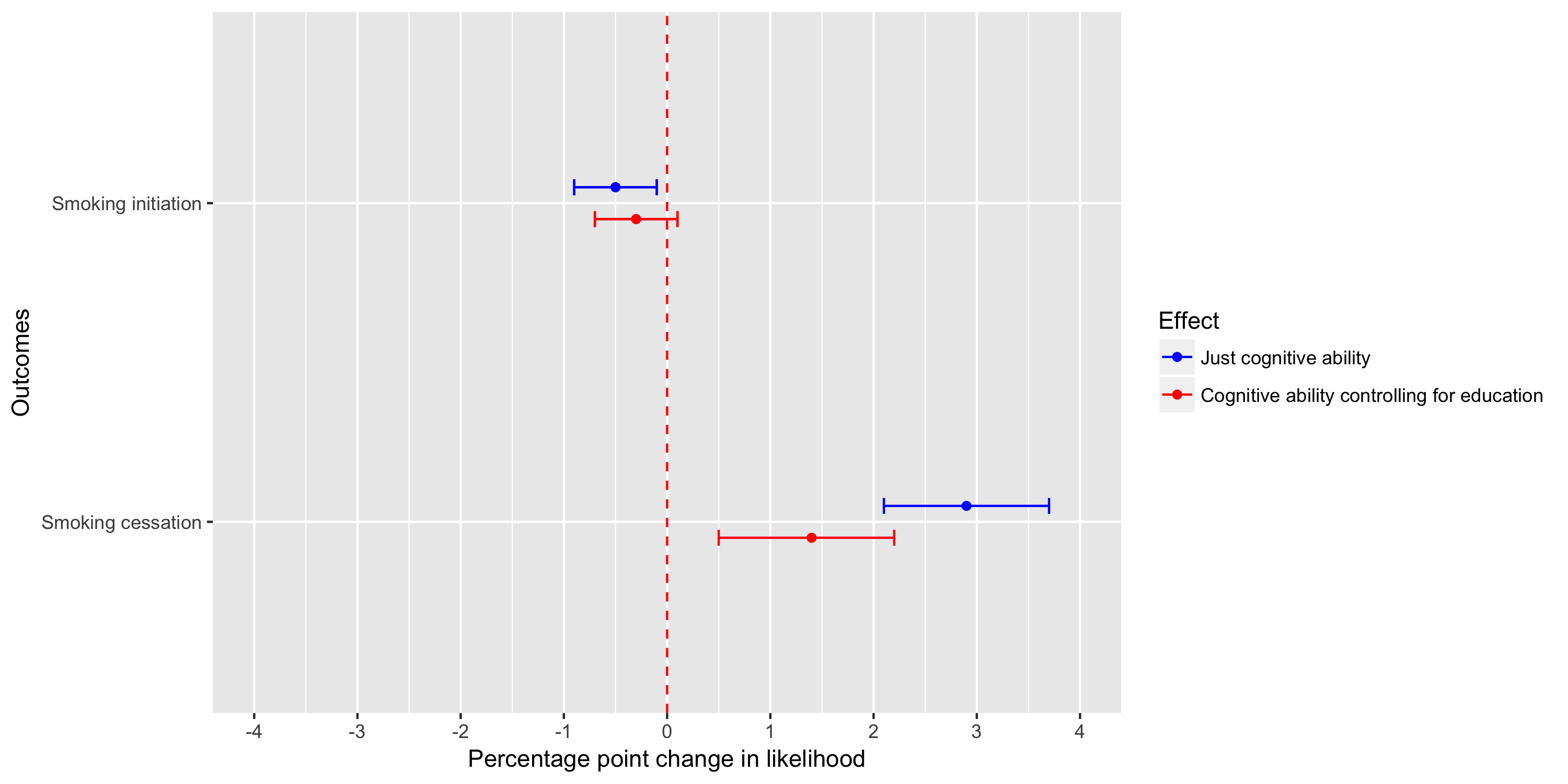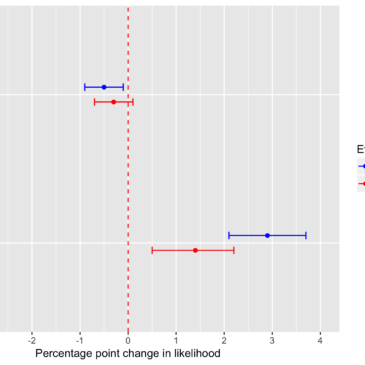Children with relatively low IQ levels are more likely than others to take up smoking as adults; they also have a harder time quitting. Can education break this cycle? This week, ASHES reviews a prospective study by Michael Daly and Mark Egan examining the relationship between childhood intelligence, lifetime educational attainment, and adult smoking behavior.
What is the research question?
What is the relationship between child cognitive ability and smoking behavior in adulthood, when accounting for educational attainment?
What did the researchers do?
The authors analyzed data from 16,653 individuals involved in two separate birth cohort studies: the 1970 British Cohort Study the 1958 National Child Development Study. Using probit regression, they examined the association between cognitive ability at ages 10 and 11 and self-reported smoking behavior (including initiation and cessation[1]) throughout adulthood.[2] They also examined whether participants’ highest level of educational attainment at age 23 and 26 mediated the relationship between childhood cognitive ability and adult smoking.[3]
 Figure. Association between childhood cognitive ability on smoking outcomes (before and after controlling for educational attainment). The circles in the figure represent changes in the probability of smoking initiation and cessation after a one unit increase in child cognitive ability (negative percentages indicate decreased likelihood of the outcome and positive percentages indicate increased likelihood of the outcome), while the lines indicate 95% confidence intervals. Statistically significant effects are those that do not intersect with a value of zero. Click image to enlarge.
Figure. Association between childhood cognitive ability on smoking outcomes (before and after controlling for educational attainment). The circles in the figure represent changes in the probability of smoking initiation and cessation after a one unit increase in child cognitive ability (negative percentages indicate decreased likelihood of the outcome and positive percentages indicate increased likelihood of the outcome), while the lines indicate 95% confidence intervals. Statistically significant effects are those that do not intersect with a value of zero. Click image to enlarge.
What did they find?
Participants with higher childhood cognitive ability were less likely to start smoking and more likely to stop smoking than those with lower childhood cognitive ability. However, when the researchers also included educational attainment in their models, the association between cognitive ability and smoking initiation disappeared, and the association between cognitive ability and smoking cessation got smaller. People with more education were less likely to start smoking and more likely to quit, if they did.
Why do these findings matter?
The results of this study demonstrate that increased levels of educational attainment can at least partially explain why kids with relatively low IQ go on to smoke as adults; education seems to play a protective role, and kids with relatively low IQ get less education. These results highlight the importance of education in helping kids to avoid smoking in adulthood and improving their chances of quitting if they do smoke.
Every study has limitations. What about this one?
This study used self-report data, meaning participants could have lied about or exaggerated their smoking behavior. The researchers didn’t consider participants’ occupation, which is likely to be related to educational attainment. This is an important limitation given that the cultures of some occupations are more accepting of smoking than others.
For more information:
We provide free, anonymous resources for helping to quit smoking. You can find them here. For additional tools, please visit the BASIS Addiction Resources page.
— Timothy Edson
What do you think? Please use the comment link below to provide feedback on this article.
________________
[1] The authors also studied relapse participants who quit smoking, but we do not present those results here.
[2]Initiation was defined as being a never smoker at one age and a smoker or ex-smoker at the next age and cessation was defined as being an ex-smoker at one age and an ex-smoker at the next age. The follow up ages were 26, 30, 34, 38, and 42 (British Cohort Study) and 23, 33, 42, 46, 50, and 55 (National Child Development Study).
[3] The authors also controlled for participants’ age, gender, social class, self-control, psychological distress, and which of the two studies they came from





Fiona July 6, 2017
What type of education had the most protective effect?
Tim Edson July 6, 2017
Hi Fiona,
The authors measured education using the UK’s national vocational qualification levels (NVQ). They found that the highest level of education (NVQ-5, which includes postgraduate degrees such as Master’s and Doctorates) shared the strongest association with a reduced probability of taking up smoking and an increased probability of quitting.
Tim
Cris Gardner August 14, 2017
Yet another proof of the importance and value of education! Yey! 🙂